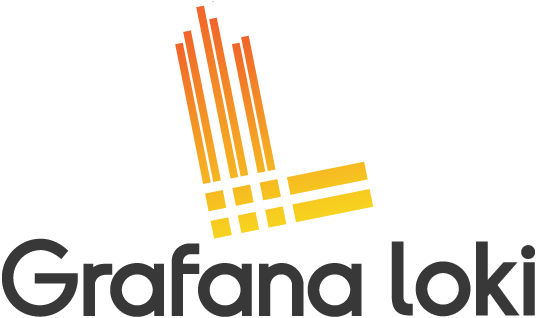Loki is a horizontally-scalable, highly-available, multi-tenant log aggregation system inspired by Prometheus. It is designed to be very cost effective and easy to operate, as it does not index the contents of the logs, but rather a set of labels for each log stream.
Compared to other log aggregation systems, Loki:
- does not do full text indexing on logs. By storing compressed, unstructured logs and only indexing metadata, Loki is simpler to operate and cheaper to run.
- indexes and groups log streams using the same labels you’re already using with Prometheus, enabling you to seamlessly switch between metrics and logs using the same labels that you’re already using with Prometheus.
- is an especially good fit for storing Kubernetes Pod logs; metadata such as Pod labels is automatically scraped and indexed.
- has native support in Grafana (already in the nightly builds, will be included in Grafana 6.0).
Loki consists of 3 components:
lokiis the main server, responsible for storing logs and processing queries.promtailis the agent, responsible for gathering logs and sending them to loki.- Grafana for the UI.
Currently there are three ways to try out Loki: using our free hosted demo, running it locally with Docker or building from source.
Grafana is running a free, hosted demo cluster of Loki; instructions for getting access can be found at grafana.com.
The Docker images for Loki and Promtail are available on DockerHub.
To test locally using docker run:
-
Create a Docker network that the Docker containers can share:
docker network create loki
-
Start the Loki server:
docker run --name loki --network=loki -p 3100:3100 --volume "$PWD/docs:/etc/loki" grafana/loki:master -config.file=/etc/loki/loki-local-config.yaml -
Then start the Promtail agent. The default config polls the contents of your
/var/logdirectory.docker run --name promtail --network=loki --volume "$PWD/docs:/etc/promtail" --volume "/var/log:/var/log" grafana/promtail:master -config.file=/etc/promtail/promtail-docker-config.yaml
-
If you also want to run Grafana in docker:
docker run --name grafana --network=loki -p 3000:3000 -e "GF_EXPLORE_ENABLED=true" grafana/grafana:master -
Follow the steps for configuring the datasource in Grafana in the section below and set the URL field to:
http://loki:3100
Another option is to use the docker-compose file in the docs directory:
- git clone this repo locally (or just copy the contents of the docker-compose file locally into a file named
docker-compose.yaml) cd loki/docsdocker-compose up
If you have have an older cached version of the grafana/grafana:master container then start by doing either:
docker pull grafana/grafana:masterOr for docker-compose:
docker-compose pullGrafana ships with built-in support for Loki in the latest nightly builds. Loki support will be officially released in Grafana 6.0.
- Open the side menu by clicking the Grafana icon in the top header.
- In the side menu under the Dashboards link you should find a link named Data Sources.
- Click the
+ Add data sourcebutton in the top header. - Choose Loki from the list.
- The http URL field should be the address of your Loki server e.g.
http://localhost:3100
Read more about the Explore feature in the Grafana docs and on how to search and filter logs with Loki.
A log query consists of two parts: log stream selector, and a search expression. For performance reasons you need to start by choosing a log stream by selecting a log label.
The log stream selector will reduce the number of log streams to a manageable volume and then the regex search expression is used to do a distributed grep over those log streams.
Searching can be done in the Explore section of Grafana (latest nightly builds) or via the logcli tool which is documented here.
For the label part of the query expression, wrap it in curly braces {} and then use the key value syntax for selecting labels. Multiple label expressions are separated by a comma:
{app="mysql",name="mysql-backup"}
The following label matching operators are currently supported:
=exactly equal.!=not equal.=~regex-match.!~do not regex-match.
Examples:
{name=~"mysql.+"}{name!~"mysql.+"}
The same rules that apply for Prometheus Label Selectors apply for Loki Log Stream Selectors.
After writing the Log Stream Selector, you can filter the results further by writing a search expression. The search expression can be just text or a regex expression.
Example queries:
{job="mysql"} error{name="kafka"} tsdb-ops.*io:2003{instance=~"kafka-[23]",name="kafka"} kafka.server:type=ReplicaManager
Loki can be run in a single host, no-dependencies mode using the following commands.
You need go v1.10+
$ go build ./cmd/loki
$ ./loki -config.file=./docs/loki-local-config.yaml
...To run promtail, use the following commands:
$ go build ./cmd/promtail
$ ./promtail -config.file=./docs/promtail-local-config.yaml
...Grafana is Loki's UI, so you'll also want to run one of those:
$ docker run -ti -p 3000:3000 -e "GF_EXPLORE_ENABLED=true" grafana/grafana:masterIn the Grafana UI (http://localhost:3000), log in with "admin"/"admin", add a new "Grafana Loki" datasource for http://host.docker.internal:3100, then go to explore and enjoy!
It is possible to configure Grafana datasources using config files with Grafana’s provisioning system. You can read more about how it works in the Grafana documentation.
Here is a simple example of the provisioning yaml config for the Grafana Loki datasource:
apiVersion: 1
datasources:
- name: Loki
type: loki
access: proxy
url: http://localhost:3100
editable: falseExample with basic auth:
apiVersion: 1
datasources:
- name: Loki
type: loki
access: proxy
url: http://localhost:3100
editable: false
basicAuth: true
basicAuthUser: my_user
basicAuthPassword: test_password- The original design doc for Loki is a good source for discussion of the motivation and design decisions.
- David Kaltschmidt KubeCon 2018 talk "On the OSS Path to Full Observability with Grafana"

